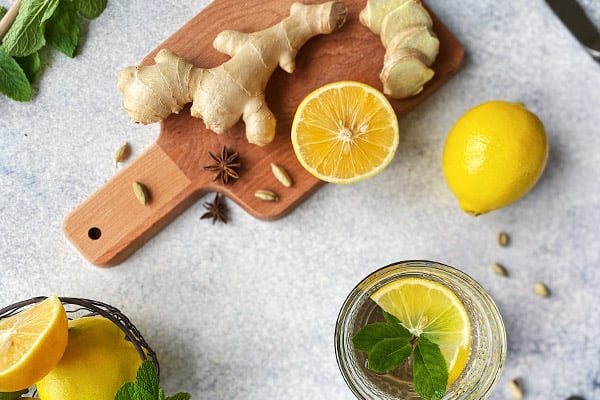Can I Take Biotin While Breastfeeding?
Biotin is an incredibly popular supplement to help grow strong and beautiful hair and nails and keep skin looking youthful and clear. If you are breastfeeding, you may be wondering, can you take biotin while breastfeeding. Below we will discuss biotin, its benefits, safety for breastfeeding women, and some of the popular quality products on the market today.
What Is Biotin?
Biotin, also known as vitamin B7, is a vitamin found in eggs, milk, and bananas. A biotin deficiency can cause thinning of the hair and sometimes a rash on the face. Biotin is an essential part of enzymes in the body because it breaks down fats and carbohydrates.
As of now, there is not a definitive test for detecting low biotin levels. Its symptoms usually identify it. These can include thinning hair and a red scaly rash around the eyes, mouse, and nose. Biotin is water-soluble and can contribute to healthy metabolic, nerve, cardiovascular, and digestive functions.
Biotin Benefits for Hair, Skin, and Nails

There are many health benefits of making sure you have adequate levels of biotin. Most of these revolve around your hair, skin, and nails. According to Medical News Today, biotin deficiency can lead to hair loss. This link indicates that the vitamin is essential in keeping the hair healthy.
Many people with a biotin deficiency will suffer from fragile, brittle nails that easily split or crack. Nails that split or crack can look unattractive and can be quite painful if the splits or cracks are close to the nail bed.
Biotin could improve the strength of nails and help alleviate this. Biotin produces fatty acids that nourish the skin. The nourishment helps to maintain a clear complexion. When our protective outer layer of skin is unbalanced, the result can be dry and dehydrated skin. Biotin assists in the production of new cells and helps oil glands function the way they are intended to.
The result? Healthier skin!
Biotin and Breastfeeding
The adequate intake of biotin for adults and pregnant women is 30 micrograms per day, but 35 micrograms per day are recommended for lactating women.
A study in The Journal of Nutrition shows that pregnant and lactating women may require more biotin than this to meet the demands of their bodies during these times. Because of this, it is essential to make sure you are getting enough biotin, whether from food, supplements, or a combination of both.
Before adding biotin as a supplement, speak with your doctor and check to ensure your prenatal vitamin does not already contain the recommended dosage you need.
Can You Take Biotin While Breastfeeding?
Yes, you can take biotin while breastfeeding. All of the B vitamins are building blocks for a healthy body and help you maintain overall good health. In conjunction with the other B vitamins below, they can keep your energy levels up and boost your body’s defense system. Make sure you are getting enough of the following B vitamins as well as biotin (B7):
- B1 (thiamine): 1.4 mg
- B2 (riboflavin): 1.6 mg
- B3 (niacin): 17 mg NE
- B5 (pantothenic acid): 7 mg
- B6 (pyridoxine): 2.0 mg
- B9 (folic acid): 600 mcg DFE
- B12 (cobalamin): 2.8 mcg
Getting the right vitamins in your diet will help you feel your very best and help with feeling less run down during breastfeeding.
Is Biotin Safe While Breastfeeding?
Biotin is safe while breastfeeding and is also recommended as biotin is beneficial to your nursing baby. When breastfeeding, you pass it to your baby through your breast milk. That is why the recommended dosage is higher for breastfeeding mothers. The quantity of biotin in breast milk is directly linked to the biotin in your blood, but the amount in your breast milk is hundreds of times more than the content in your blood. So, if you have asked can you take biotin while breastfeeding, the answer is yes.
Can I take 10,000 mcg of biotin while breastfeeding?
According to the Institute for the Advancement of Breastfeeding & Lactation Education, biotin is one of the vitamins considered safe in high doses when breastfeeding. They also classify a high amount of biotin to be 2,500 mcg and not 10,000 mcg. High-dose biotin is likely safe during breastfeeding because it has a wide safety margin in humans. If you are interested in continuing high doses of biotin while breastfeeding or just starting to take the vitamin, it is best to speak to your doctor first.
What Foods Have Biotin?
Biotin is a vitamin in many healthy foods that can be easily added to your diet. If you eat a varied diet, you may find it easy to keep your levels at an optimal place. Below are some of the top ten foods that are rich in biotin.
- Legumes
- Sweet potatoes
- Bananas
- Yeast
- Egg yolks
- Nuts and seeds
- Liver
- Mushrooms
- Broccoli
- Avocados
Try incorporating some of these into your diet daily to help keep your biotin levels optimum and your body feeling and looking great!
Best Biotin Supplement While Breastfeeding
To find the best biotin supplement for you during breastfeeding, you should reach out to your doctor. They will want to discuss your current nutrition, lifestyle, and possible deficiencies. There are many on the market, and they can help you choose the right one for you.
Biotin for Hair Growth – Biotin Shampoo and Conditioner
Suppose you suffered hair loss or thinning due to your pregnancy. In that case, you may be wondering if shampoos and conditioners containing biotin may help regrow hair and make your hair feel overall healthier and fuller. The scientific data regarding topical biotin working to regrow and thicken hair is still weak at this point, but many hair products contain biotin and may help your hair feel more nourished.
Below are ten of the best biotin-containing products as reviewed by Women’s Health UK.
- Pantene Grow Strong – Best for brittle hair
- L’Oreal Elvive Full Resist Reinforcing – Best for damaged hair
- OGX Thick & full + biotin & collagen – Best for fine hair
- L’Oreal Professionnel Serie Expert Inforcer – Best for colored hair
- Kevin Murphy Hydrate.Me – Best for natural hair
- Grow Gorgeous Intense Thickening – Best for curls
- Briogeo Don’t Despair, Repair! Super Moisture – Best overall
- Larry King Hair Care Good Life – Best for dry hair
- JASON Hair Care biotin & Hyaluronic Acid – Best budget
- Briogeo Scalp Revival Charcoal & Biotin – Best dry shampoo
Although clinical data are lacking on its efficacy, adding in one of these products might help the appearance and feel of your hair postpartum.
Best Biotin Gummies
Vitamin and supplement gummies are some of the most popular products on the market today. They are great for people who dislike taking pills or just enjoy their vitamins and supplements being fruity and delicious. Two of the most popular biotin gummies on the market today are:
Bronson Biotin Gummies

Manufactured in an FDA-certified, cGMP facility. Naturally colored and flavored using blueberry flavor and purple carrot juice concentrate. Each serving provides 16,667% of the daily value for biotin.
Nature Made Biotin Gummies

Verified by United States Pharmacopeia (USP). They are one of the best-known third-party supplement testing organizations. The gummies are gluten-free and provide 10,000% of the daily value for biotin per serving.
There are many other gummies on the market. Make sure you do your research to get quality ingredients and companies that are transparent with their manufacturing and testing.
- Emergen C Gummies While Nursing
- Goli Gummies While Breastfeeding
- Is Collagen Safe While Breastfeeding
Best Biotin Pills
As with gummies, there are many biotin supplement pills on the market. Some are tablets, while others are softgels. These vary in price per serving, so it is always best to look into biotin that fits your budget and is also effective.
Some of the best on the market today include:
SolaGarden Naturals Whole Food Biotin

Organic and vegan, and only contains two ingredients. Provides 1,677% of the daily value for biotin per serving. Meets Food and Drug Administration (FDA) guidelines.
Garden of Life MyKind Organic Plant Collagen Builder

Organic, gluten-free, non-GMO, and vegan. Contains 8,333% of the daily value for biotin. It is tested by NSF International, a well-known third-party testing organization.
Pure Encapsulations Biotin

Biotin-only softgel is hypoallergenic, gluten-free, non-GMO, vegan, and third-party tested. Provides 26,667% of the daily biotin per serving.
When looking for a biotin supplement pill, make sure to look for limited ingredients, transparency in ingredients, and third-party testing.
Biotin Side Effects
Biotin is considered safe and has relatively few side effects when taken orally in recommended doses or applied topically as directed. When taken orally, biotin is likely safe when taken in amounts up to 300 mg daily for up to six months at a time. It is more commonly used in lower doses of around 2.5 mg daily. Applied topically, biotin is considered safe for most people when applied in amounts up to 0.6% biotin. If taken above recommended doses, an excess amount can cause a decrease of pantothenic acid (B5) in the intestines. That could lead to cystic acne. A few other side effects that have been reported include frequent urination, nausea, cramping, and elevated blood sugar levels.
Bottom Line,
Hopefully, you feel comfortable continuing with or adding biotin to your vitamin and supplement routine while breastfeeding with the above information. If you had been asking yourself, can you take biotin while breastfeeding, reach out to your doctor first to make sure you both feel comfortable with all vitamins you are currently taking or plan to take during this time.
Related:
- Can You Use Salicylic Acid While Breastfeeding
- Hyaluronic Acid While Breastfeeding – Is It Safe?
- Is Collagen Safe While Breastfeeding
- Can You Use Retinol While Breastfeeding








